Written by Lucie Villeneuve, nutritionist, M.Sc.
Herbs and spices have so many benefits and are such an easy way of getting in lots of nutrients. Adding them to your meals can help boost their nutrient content and costs very little effort.
So what are the benefits of herbs and spices and how can you use them?
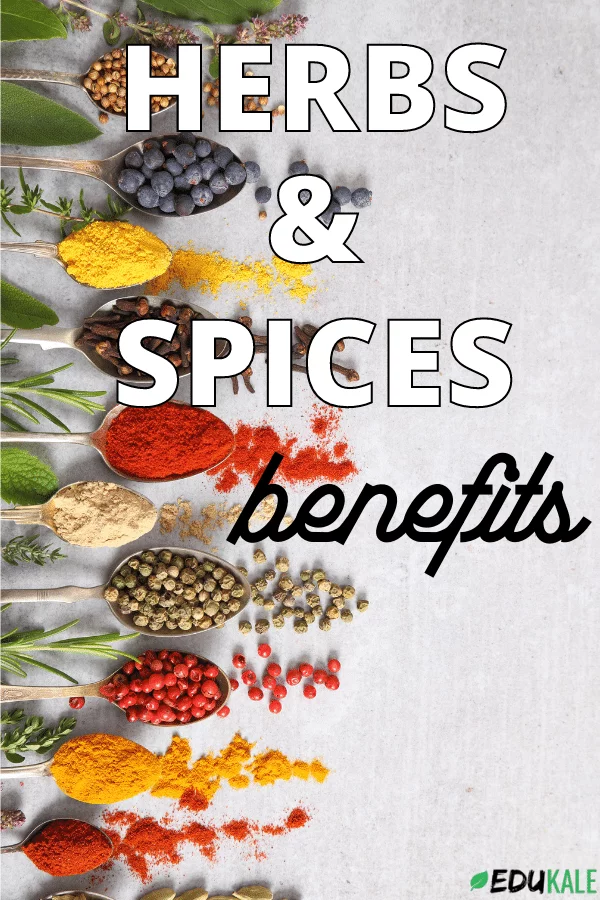
Benefits of herbs and spices
Turmeric is one of my favorite spices that I put on anything, and it’s the one with the most benefits. Its main ingredient is curcumin, which gives it a bright yellow color. It contains certain medicinal properties [1] and studies [2] show that it has strong anti-inflammatory activities and can be used as a remedy for the prevention and treatment of chronic diseases.
Curcumin is also an antioxidant that neutralizes free radicals, so it helps prevent stress and damage in your body [3]. You can read my article on antioxidants for more info if you’re interested!
Because inflammation is linked to the promotion of tumor growth, curcumin’s anti-inflammatory properties could have anti-cancer effects. Through its anti-inflammatory and anti-oxidant effects, curcumin could also help prevent heart disease [4]. Both these properties also convey anti-aging properties to curcumin [5].
So if there’s one spice you need to start using, it’s definitely this one! But there are plenty of others as well…
Different kinds of pepper: black pepper, chili pepper, cayenne pepper…all have benefits.
Chili and cayenne pepper, for instance, contain capsaicin, which has been shown to reduce appetite and increase fat burning, combat certain forms of cancer, and help deal with chronic pain [6,7].
Black pepper contains piperine, which has high antioxidant and anti-inflammatory properties. It’s also antidiabetic, antiobesity, cardioprotective, and anti-allergic, so make sure that you’re grinding some black pepper on all of your dishes [8].
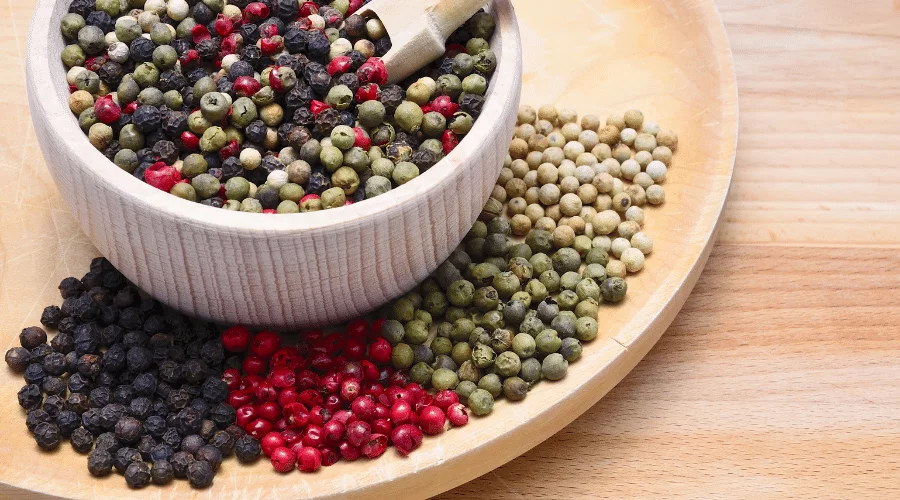
Oregano, rosemary, and thyme are also very beneficial. I’m grouping these three together because they share a lot of the same polyphenols, which are antioxidants, and therefore benefits. Some of these include anti-obesity effects, anti-inflammatory activities, and antimicrobial properties
Parsley contains several different flavonoids, which are a type of antioxidants. Some of them are associated with anti-inflammatory activities and others are potential cancer preventive agents.
Garlic has tons of benefits as well, like boosting the immune system, for instance. it can help prevent catching colds and the flu as well as reduce the severity of the symptoms [9].
Garlic can also help reduce blood pressure [10] and reduce LDL cholesterol [11]. Garlic is also a good source of antioxidants and has anti-cancer effects [12,13].
Ginger is known as an aphrodisiac for some people (which I’m really not sure about), but it can also be used as a treatment for nausea. Also, many components in ginger have been found to have anti-inflammatory, antibacterial, antipyretic, antilipidemic, antitumorigenic, and antiangiogenic effects.
Cinnamon is the spice I add to all of my desserts because it tastes so good and has so many benefits as well. It is loaded with antioxidants and has important anti-inflammatory and anti-microbial properties. It’s also an anti-cancer and anti-diabetic agent and can help prevent neurodegenerative diseases like Alzheimer’s and Parkinson’s.
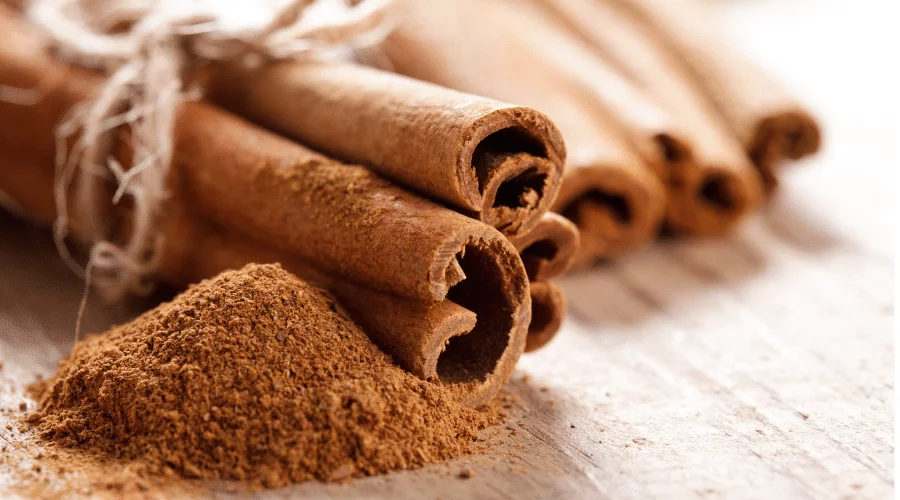
There are many more incredibly delicious and beneficial spices, but these are the ones on which most studies have been done. Most herbs and spices contain antioxidants, so keep on using any ones you like, even if they didn’t make the list.
I also want to emphasize that, even if these herbs and spices have very real benefits, a lot of these studies are done using really high amounts of the beneficial compounds that you are unlikely to naturally get from the herbs and spices.
So obviously, herbs and spices aren’t magical remedies: if you just sprinkle a few on your highly processed junk food meal, it won’t change anything. You still need to be eating plenty of fruit and veggies and other whole foods.
This also needs to be something you do regularly— adding different spices to each meal— in order to actually reap the benefits. There isn’t any specific amount of spice that has been calculated to have an effect, just use the amount you like and use them often!
How to use different herbs and spices
The best way to go about this is to put whichever herbs and spices you want on whatever food you want, and figure out what tastes good to you.
To get you started, here are some food/spice combinations I recommend, just because I like the taste:
- nutmeg in preparations like quiches, pies, savory cakes
- basil, oregano, and thyme in veggie salads (on tomatoes, etc)
- curry and turmeric on dishes with vegetables and grains
- saffron and cumin on dishes with vegetables and grains
- curry and coconut with red lentils and tomatoes
- cilantro and rosemary in potato dishes
- garlic and pepper on literally anything you like
- ginger in cookies or tea
- cinnamon in desserts or in yogurt
You can also check out this ultimate spice pairing guide to give you some more ideas.
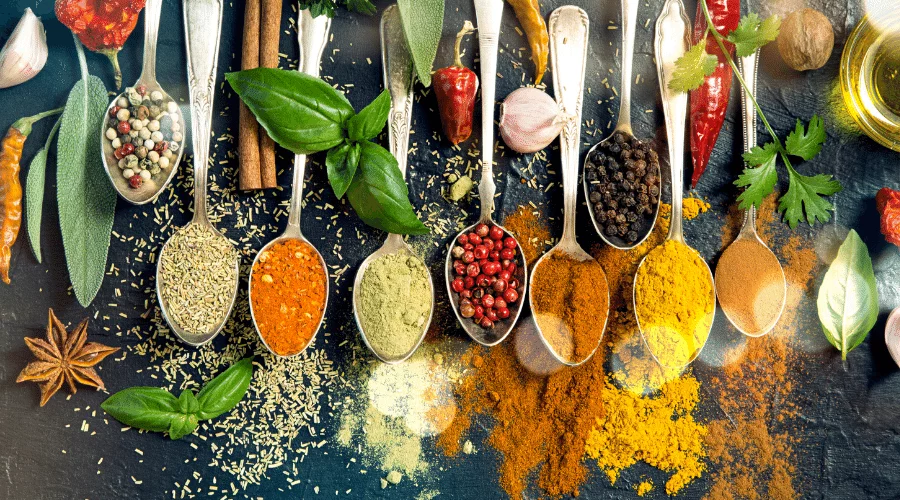
Beyond the taste factor, certain spices are better when you eat them together! For instance, it’s a good idea to boost the absorption of curcumin, the compound in turmeric, by consuming it with black pepper, which contains piperine.
In order to maximize the antioxidant content of your spices, it’s also better not to fry or grill them: stewing or even microwaving is better, but when you’re unable to do that, don’t forget to sprinkle some more spices after you’re finished cooking the dish!
Are fresh herbs better than dried ones?
There may be this misconception that fresh herbs are better or that dried spices aren’t that useful compared to fresh but that is totally false. I definitely find that fresh ones taste better, but they are also far more expensive and more difficult to store as they go bad quickly.
In terms of the health and nutritional aspect, dried herbs have been intentionally dried in a way that preserves their nutrients and beneficial properties.
If you get fresh herbs, it’s better to add them towards the end of the cooking process or after it so they stay nice and fresh, and if you get dry herbs, it’s better to add them as early as you can so they can develop the flavor.
You also need to watch out for the quantities: dried herbs and spices are around 3 times more potent than fresh, because all the water is gone and the nutritional properties are very concentrated.
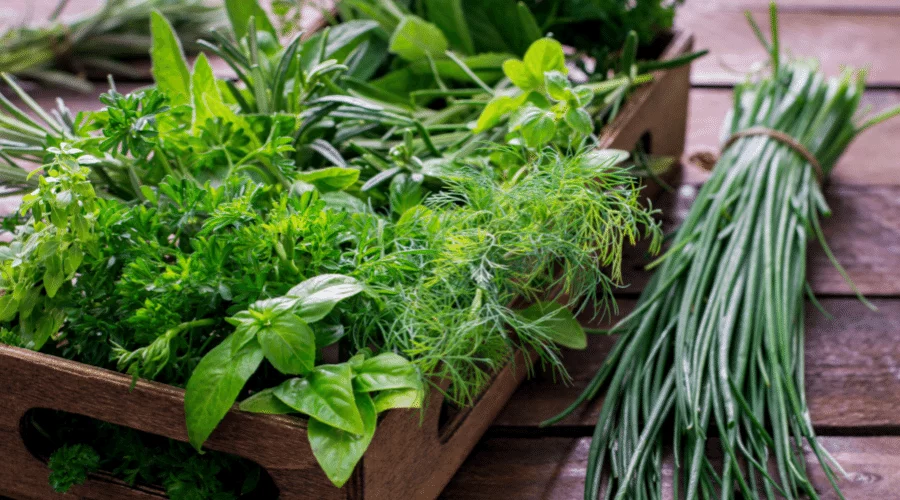
I really recommend getting some sort of herbs and spice rack for all of your dry herbs and spices. I use mostly dry because of their convenience, but if the recipe calls for it I will get them fresh.
For instance, if I want to make a ginger and honey tea, I’ll buy fresh ginger, but if I just want to add some ginger flavoring to a cake, I’ll use powdered ginger. If I want to make a homemade tomato and basil pizza, I’ll get fresh basil, but if I just want to season my salad, I’ll use dry, powdered basil. Also, if the spice is the center of the meal (say I want to make a cilantro salad for instance), I’ll get the fresh version. But other than that, I just use dried herbs and spices.
In short
Herbs and spices have many benefits and are so easy to sprinkle onto your food for a nutrient boost. Make sure that you try out different combinations so that adding them to your meals becomes a habit!
-Lucie

